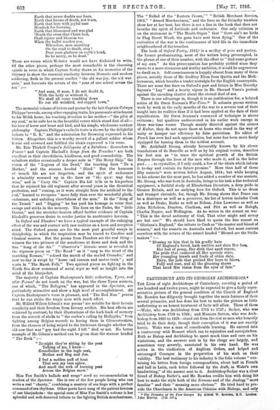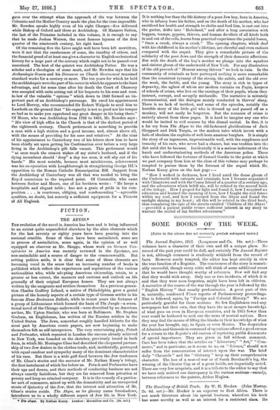CANTERBURY AND ITS GEORGIAN ARCHBISHOPS.*
Tan Lives of eight Archbishops of Canterbury, covering a period of one hundred and twelve years, might be expected to give a fairly repre- sentative picture of the general condition of the Church of England Mr. Rowden has diligently brought together the main features of their several primacies, and has done his beat to make the picture as little unflattering as an honest treatment of facts will allow. Three of them —Wake, who was Archbishop from 1716 to 1737 ; Seeker, who was Archbishop from 1758 to 1768 ; and Manners Sutton, who was Arch- bishop from 1805 to 1828—stand out from the rest as men who honestly tried to do their duty, though their conception of it was not exactly heroic. Wake was a man of considerable learning. He entered into a controversy with Bossuet which ran to rejoinders and surrejoinders. Both as Bishop and Archbishop he spent much time and care on his visitations, and the answers sent in by the clergy are largely, and sometimes very severely, annotated in his own hand. He was active in the vindication of Anglican Orders, and helped and encouraged Courayer in the preparation of his work on thole validity. The best testimony to his industry Is the folio volume " con- taining his letters from foreign correspondents, about half in French and half in Latin, each letter followed by the draft, in Wake% own handwriting," of the answer sent to it. Archbishop Seeker was a Close friend of Bishop Butler's, and Mr. Bowden credits him with doing his best to make the style both of the Sermons and of the Analogy" more familiar " and their " meaning more obvious." He tried hard to pro- vide the Churchmen in the American Colonies with Bishops, and only • The Printates of the Pour Georges By Aldred W. Bowden, 5.0. London John Murray. [12s. net.1 gave over the attempt when the approach of the war between the Colonists and the Mother Country made the plan for the time impossible. Mr. Rowden speaks highly even of his eight Charges—five delivered while Bishop of Oxford and three as Archbishop. Of Manners Sutton, the last of the Primates included in this volume, it is enough to say that he made Joshua Watson, the most famous layman of the first quarter of the nineteenth century, his right hand.
Of the remaining five the Lives might well have been left unwritten, were it not that the carelessness of some, the timidity of others, and the financial greed of at least one give a character to English ecclesiastical history for a large part of the century which ought not to be passed over unnoticed. The best of the quintet was Archbishop Potter. He was a scholar and a theologian of some mark, and Mr. Rowden says that his Archaeologia Greece and his Discourse on Church Government remained standard works-for a century or more. The ten years for which he held the archbishopric were the part of his career in which he appears to the least advantage, and for some time after his death the Court of Chancery was occupied with suits arising out of his bequests to his sons and sons- in-law of the valuable " options " which down to 1840 formed an im- portant part of an Archbishop's patronage. He owed his appointment to Lord Hervey, who recommended Sir Robert Walpole to send him to Lamboth on the ground that " his capacity is not so good nor his temper so bad as to make you apprehend any great danger in his being there." Of Moore, who was Archbishop from 1783 to 1805, Mr. Rowden says : " His view of high office in the Church is that of the darkest period of the eighteenth century. Church preferment is something to provide a man with a high station and a good income, and, almost above all, with the means of providing for his sons and relatives." At the time of his appointment to Canterbury two of his letters show him to have been chiefly set upon getting his Confirmation over before a very large living in the Archbishop's gift falls vacant. This preferment would " at once reach the utmost wishes of my sister's husband, and if the dying incumbent should drop.' a day too soon, it will slip out of his hands." His most notable, because most mischievous, achievement was his co-operation with Loughborough in strengthening George M.'s opposition to the Roman Catholic Emancipation Bill. Support from the Archbishop of Canterbury was all that was needed to bring the Royal conscience to the required point. Of Cornwallis, who came between Seeker and Moore, one of his brethren wrote : " He keeps a hospitable and elegant table ; has not a grain of pride in his com- position . . . is courteous, obliging, and condescending "—agreeable qualities, no doubt, but scarcely a sufficient equipment for a Primate of All England.































 Previous page
Previous page